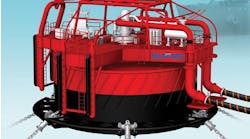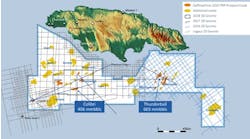Offshore staff
LONDON – Further intervention is needed to make Britain’s new offshore field developments economic, according to analysts GlobalData.
Despite thegovernment’s recent actions to attract investment in the UK’s E&P sector, low oil prices and the country’s high tax burden are adding further pressure.
In his autumn statement, UK Chancellor George Osborne announced a supplementary charge reduction that will decrease the overalltax rate on the E&P sector from 62% to 60%, effective from Jan. 1, 2015.
However, Will Scargill, fiscal analyst for GlobalData, claimed the simultaneous removal of the price-based trigger mechanism, which could have reduced the total tax rate by 12%, would not be considered a beneficial trade-off by E&P investors if the oil price does not recover from its current level.
“The 2% supplementary charge reduction is unlikely to have a significant impact on investment decisions, as the resultant reduction in fiscal take is limited and the break-even oil price for a typical North Sea field is decreased by less than $1/bbl.
“However, even reducing the charge to 20% would not push the break-even price below $70/bbl, suggesting that if the oil price does not rebound in the medium to long term, more substantial changes will be required to allow companies to invest in new field developments.”
The government’s new cluster allowance, targeting high-pressure/high-temperature fields in the central North Sea in particular, should benefit companies with qualifying projects by reducing their tax burden. But there are few projects in this category, Scargill suggested, with the Maersk-operatedCulzean gas field being the only sanctioned development eligible to date for the allowance.
“Overall, the UK is sending positive signs to E&P firms, but high operational costs mean that the recent tax amendments are no game-changer for the investment climate. Even if oil prices improve, the UK continental shelf is becoming less competitive as it matures and will require more attractive fiscal incentives.
“Without investment in extending the lives of producing fields, existing infrastructure will be decommissioned earlier. This will have the knock-on effect of reducing the commercial viability of smaller fields, which depend on such infrastructure, leaving resources below ground and ultimately resulting in a decline in sector size and associated tax receipts.”
01/07/2015


